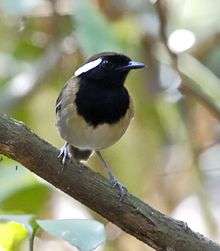Chestnut-belted gnateater
| Chestnut-belted gnateater | |
|---|---|
 | |
| Scientific classification | |
| Kingdom: | Animalia |
| Phylum: | Chordata |
| Class: | Aves |
| Order: | Passeriformes |
| Family: | Conopophagidae |
| Genus: | Conopophaga |
| Species: | C. aurita |
| Binomial name | |
| Conopophaga aurita (Gmelin, 1789) | |
| Subspecies | |
|
See text | |
The chestnut-belted gnateater (Conopophaga aurita) is a species of bird in the Conopophagidae family, the gnateaters. It is found in the Amazon Basin of northern Brazil, southern Colombia and eastern Peru and Ecuador; also the Guianan countries of Guyana, Suriname and eastern French Guiana. Its natural habitat is tropical moist lowland forests.
Description
It is a small dark bird with a relatively stout bill, brown upperparts and crown (the latter often tinged rufous), a white supercilium, and pinkish-grey legs. The male has a black frontlet, face and throat, a rufous chest, and buff or white belly. The female has a rufous face, throat and chest, and a buff or white belly. Males of the subspecies snethlageae and pallida are distinctive, as the black of the face and throat extends well onto the central chest, with rufous of the underparts limitied to the edge of the black chest.
Subspecies
Six subspecies are recognized:
- C. a. inexpectata Zimmer, JT, 1931 - Colombia and Brazil
- C. a. aurita (Gmelin, 1789) - Colombia and Brazil
- C. a. occidentalis (Chubb, 1918 - the Guianas and northeast Brazil
- C. a. australis Todd, 1927 - eastern Peru and southwest Amazonian Brazil
- C. a. snethlageae von Berlepsch, 1912 - central Brazil. Sometimes referred to as Snethlage's gnateater.
- C. a. pallida Snethlage, E, 1914 - southeast Amazonian Brazil
Distribution
The range of the chestnut-belted gnateater is throughout the Amazon Basin, centered on the Amazon River. The following range limits are: it covers the entire downstream half of the regions in the south Basin and does not extend into Bolivia. The limits in the west are eastern and northeastern Peru with parts of northeast Ecuador and southern Colombia; the limit in this area in the west and northwest is the Rio Negro and the species is not found in the north central Amazon Basin of most of Brazil's Roraima state.
The range in the northeast Basin beyond the Amazon River outlet extends through Amapá state into the Guianas to the Atlantic coast, and the central and eastern Guiana Shield to include only eastern Guyana.
References
- ↑ BirdLife International (2012). "Conopophaga aurita". IUCN Red List of Threatened Species. Version 2013.2. International Union for Conservation of Nature. Retrieved 26 November 2013.
External links
- Chestnut-belted gnateater photo gallery VIREO
- Graphic-Medium Res & synopsis www.eln.gov.br–(Portuguese)
- Photo-High Res; Article oiseaux
